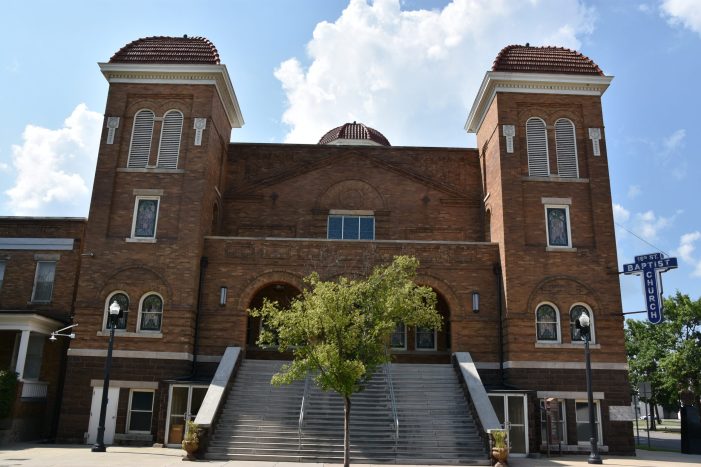By Brian Figeroux, Esq. | Editorial Credit: Ritu Manoj Jethani / Shutterstock.com
“It is appalling that the most segregated hour of Christian America is eleven o’clock on Sunday morning.”
— Dr. Martin Luther King Jr.
These words, spoken more than half a century ago, still ring painfully true today. While America has made significant progress in civil rights, one of the starkest reminders of ongoing racial separation lies in a place that should embody unity: the church. Despite preaching love, grace, and brotherhood, Sunday morning remains the most segregated time of the week. This is more than a cultural quirk—it’s a spiritual crisis. The question must be asked: Why is this still the case? And more importantly, what can Christians, with God’s guidance, do about it?
The Roots of Sunday Segregation
To understand how we got here, we have to go back to America’s foundational sins—slavery, segregation, and systemic racism. During slavery, Black believers were often forced to worship in separate quarters or were not allowed to worship at all unless under the oversight of white masters. Post-emancipation, Black Christians established their own churches—not simply as places of worship, but as sanctuaries from discrimination and violence. These churches became vital centers of community, resistance, and hope.
Meanwhile, many white churches either supported the institution of slavery, remained silent on civil rights issues, or actively excluded Black believers. Even today, many denominations are still grappling with their histories of racial complicity. Over time, this institutional separation solidified, shaping worship styles, leadership structures, and church culture.
Why the Divide Still Exists
In today’s churches, the persistence of segregation is not always overt racism—it’s often more subtle and systemic. Many congregations remain racially homogeneous due to cultural comfort zones, worship preferences, and the idea that “people like to worship with people who look like them.” There are also denominational divides, historical legacies, and geographical patterns that keep communities apart.
Moreover, the church has not always prioritized intentional inclusion. While many pastors acknowledge the importance of diversity, far fewer take proactive steps to dismantle segregation within their congregations. Without a deliberate, prayerful effort to build multiracial relationships and leadership, the status quo remains intact.
Who Benefits From Division?
We must ask: who gains when the body of Christ remains divided? Spiritually speaking, the ultimate benefactor of Christian disunity is Satan. Division undermines the power of our collective witness, weakens our unity, and distracts us from the work of the Kingdom. When God’s people are divided, our testimony to the world is diminished. Jesus prayed in John 17 that His followers would be one, so that the world may believe.
Socially and politically, entrenched powers also benefit when Christians are separated by race. Division allows for manipulation along racial and ideological lines. It keeps communities from building shared understanding and solidarity against injustice. When churches stay in their lanes, they often fail to speak with one prophetic voice against sin and systemic evil.
God’s Vision for Unity
But God offers a radically different vision—one of reconciliation, inclusion, and unity in diversity. Scripture repeatedly affirms the oneness of all believers in Christ: “There is neither Jew nor Gentile, slave nor free, male nor female, for you are all one in Christ Jesus” (Galatians 3:28). In Revelation 7:9, we glimpse a heavenly vision of a multitude from “every nation, tribe, people and language” worshiping God together.
Jesus modeled cross-cultural ministry—speaking with Samaritans, healing Roman servants, and embracing outcasts. His table was diverse, and His church was meant to be the same. Christians are called to be ambassadors of reconciliation (2 Corinthians 5:18), not protectors of comfort zones.
How Christians Can End the Sunday Sin
If Christians truly care—and we must—change starts with repentance. We have to name and grieve the sin of segregation, not just as a cultural failure but as a spiritual one. This means confessing both personal prejudices and systemic patterns in our congregations.
Second, churches must take practical, Spirit-led steps toward unity. This includes:
- Cross-racial partnerships: Joint services, mission projects, and events between predominantly Black, white, Latino, and Asian churches.
- Pulpit swaps and shared leadership: Inviting pastors of different backgrounds to preach and lead.
- Multiracial leadership teams: Reflecting diversity at the decision-making level.
- Congregational education: Facilitating open, honest conversations about race, history, and justice.
Most importantly, these efforts must be saturated in prayer, humility, and a desire to reflect Christ’s love—not tokenism or political correctness.
Conclusion: A Call to Unity
The continued racial divide in American churches is not just a sociological issue—it is a sin that grieves the heart of God. Every Sunday that we worship in racial isolation, we miss an opportunity to live out the Gospel in its fullness.
But there is hope. By the power of the Holy Spirit, God’s people can break down the walls that divide. If we care—truly care—about being a unified body, then we must commit to the hard, holy work of reconciliation. In doing so, we bear witness to a kingdom that is not of this world—a kingdom where every tribe, tongue, and nation worships side by side.
It’s time for Sunday to be the most unified day of the week.

